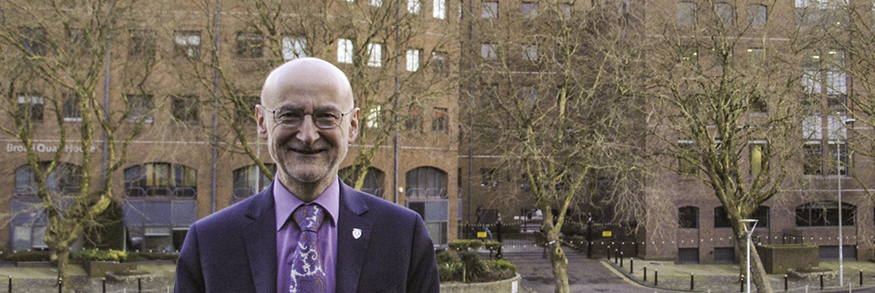Greening Lancaster University's District Heating

As one of Lancaster's first science students, John Treble has gone full circle, returning to the university for a gratifying project and to celebrate at the 50th anniversary events.
John’s appreciation of the physics he learnt at Lancaster led him to return fifty years later to advise on how to improve the efficiency of its District Heating System – and he wears the University badge with pride.
In 1965 John Treble (Theoretical Physics, BA 1969, MSc 1970, Bowland) was one of Lancaster’s first science students. There were just a few buildings at Bailrigg and the Physics and Chemistry Departments were housed in a converted Waring & Gillow warehouse in the centre of Lancaster. There was no student university accommodation so John lived in out-of-season guest houses in Morecambe and Heysham – pioneering stuff!
On graduating, John’s first job was in the Scientific Civil Service and whilst there he developed an interest in environmental conservation – becoming a 1970s Eco-Warrior. This must have been a product of his childhood interest in natural history – a career path that he was successfully deterred from by his parents saying 'there can only be one Peter Scott and there will be no money in it'.
John quickly discovered that the Civil Service was not for him and struck out as an entrepreneur founding a series of environmental businesses. The first of these was Conservation Books, a mail order environmental book service.
When UK paper mills were just starting to experiment with recycled printing and writing papers, John started ForestSaver to sell such products via mail order, wholesale to retailers, bespoke products for retail chains and charities, merchanting to printers and greetings card publishers. Bizarrely, the bridge from books to recycled paper was made via the humble envelope reuse label. A tiny mention in the pages of The Times or Woman’s Own would generate orders for a million labels!
The success of these businesses led to John forming Conservation Communications to provide environmental marketing and consultancy services for paper mills and other companies. The new company’s first project was to exclusively market Conservation, a watermarked business letterhead range, which John had developed with a paper mill. When the mill was taken over by the second largest papermaker in the world, it was their most successful product range in Europe.
In 1992, John started The Green Consultancy (TGC) offering energy and sustainability consultancy to large organisations. John is passionate about correctly applying physics to reducing energy consumption and carbon emissions and TGC applies a rigorous scientific Energy Efficiency Methodology to accurately determine where savings can be made by finding out what is not working efficiently, by how much and why.
John believes that, despite the obvious need to measure the energy efficiencies of systems and buildings, most energy consultancies make no attempt to do so. He considers that, as a result, some universities' Carbon Management Plans would have to defy the laws of physics to achieve their objectives!
TGC’s clients include two thirds of UK universities – bringing John full circle back to Lancaster for his most gratifying work following an extremely enjoyable weekend attending the 50th Anniversary events.
The University’s District Heating System (DHS) had evolved and aged over fifty years and was not operating efficiently. In addition, the university required feasibility studies into the extension of the DHS and the separation of generation and distribution.
The University now has a sound basis on which to plan for the improvement and expansion of the DHS over the second fifty years of its life. John looks forward to the opportunities for providing technical support to the resulting projects and ensuring their success.
For further details of the work visit Lancaster University Case History.

